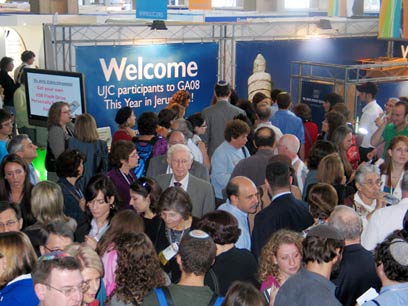
Immigrants arrive in Israel (archives)
Photo: Amnon Meranda
Most of the world's Jews do not live in Israel, says a poll summing up the past decade. There are currently 13.3 million Jews living in 100 countries all over the world, 41% of which have made Israel their home.
A similar number, 40%, live in the US. However experts have predicted that the tables are set to turn, and that within 20 years most Jews will be living in Israel.
Changing Demographics?
Yael Branovsky
Some 16,200 Jews made aliyah in past year, compared with 13,860 in 2008. Most immigrants hail from former USSR, but few also come from Lebanon, Hong Kong, Madagascar
"Interfaith marriage among Jews is on the rise in every country in the world," says Professor Sergio Della Pergola, an expert on Jewish demographics and the head of the Shlomo Argov chair of Israel-Diaspora Relations at the Hebrew University of Jerusalem.
"However there are differences between the various Jewish communities in the world. Currently the highest rate of interfaith marriages is in the states of the former USSR – where more than 75% of Jews marry non-Jews. In the US the figure is close to 55%, in France and England over 40%, in Canada 35%, in Australia 25%, and in Mexico 10%," he told Ynet.
Della Pergola says the differences result in part from Jewish education as well as the proximity of other cultures.

Russia: Jewish education failing? (Photo: Israel Bardugo)
"Of these two reasons, there is no doubt that the openness of society as a whole, while on the Jewish side there is a desire to fit in and climb the social ladder, can lead to the sacrificing of many Jewish characteristics and eventually its basic value system," the professor explains.
However, he stressed that every Jewish community also includes many Jews who maintain their faith above all else.

Jewish Agency lecture in South Africa
Della Pergola added that there are many organizations currently working to change the statistics on assimilation. "Chabad, for example, is everywhere today," he said.
"The Joint, the conservative movement, and the reform movement are working effectively in Eastern Europe and Latin America, and the presence of Shas, the Jewish Agency, and other Israeli organizations are also felt," the professor added.
"In Western Europe, despite the aspirations for Jewish organizational independence within the European Union, the main factors affecting the daily Jewish character are mainly based in the US and Israel."

Jewish Federation conference in US (Photo: Diana Zinkler)
But when asked whether he thought Jewish communities would disappear entirely from certain states, Della Pergola said this very rarely happened.
"The presence of Jews in certain countries is a reflection of history, meaning Jews were present in the same place in the past in certain numbers, and is significantly affected by social, political, and economic elements which create positive or negative conditions for the Jewish collective," he said.
"Jews are normally well-educated members of society and require a suitable social and authoritative framework. This explains why the vast majority of Jews are currently residing in the 38 most developed countries in the world, including Israel, ranked 23rd. Future changes in state infrastructure will lead to changes in the geographic map of Jews in the world."















